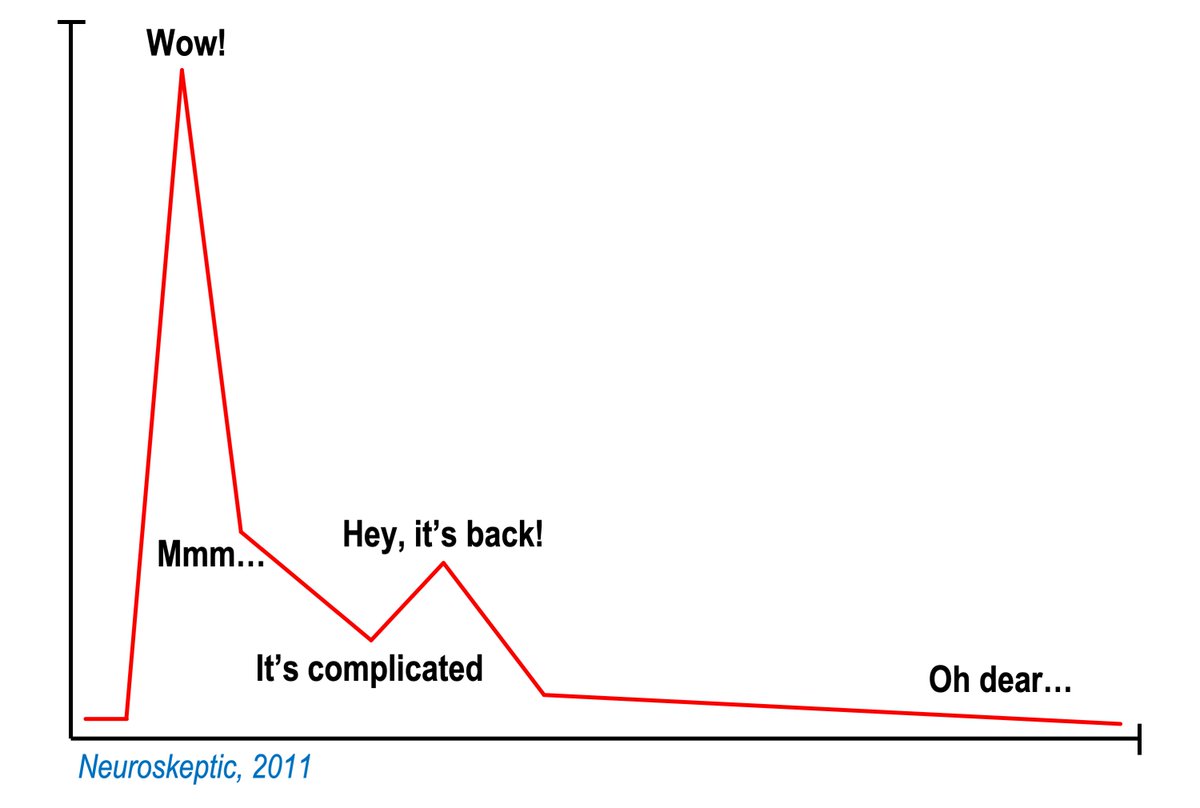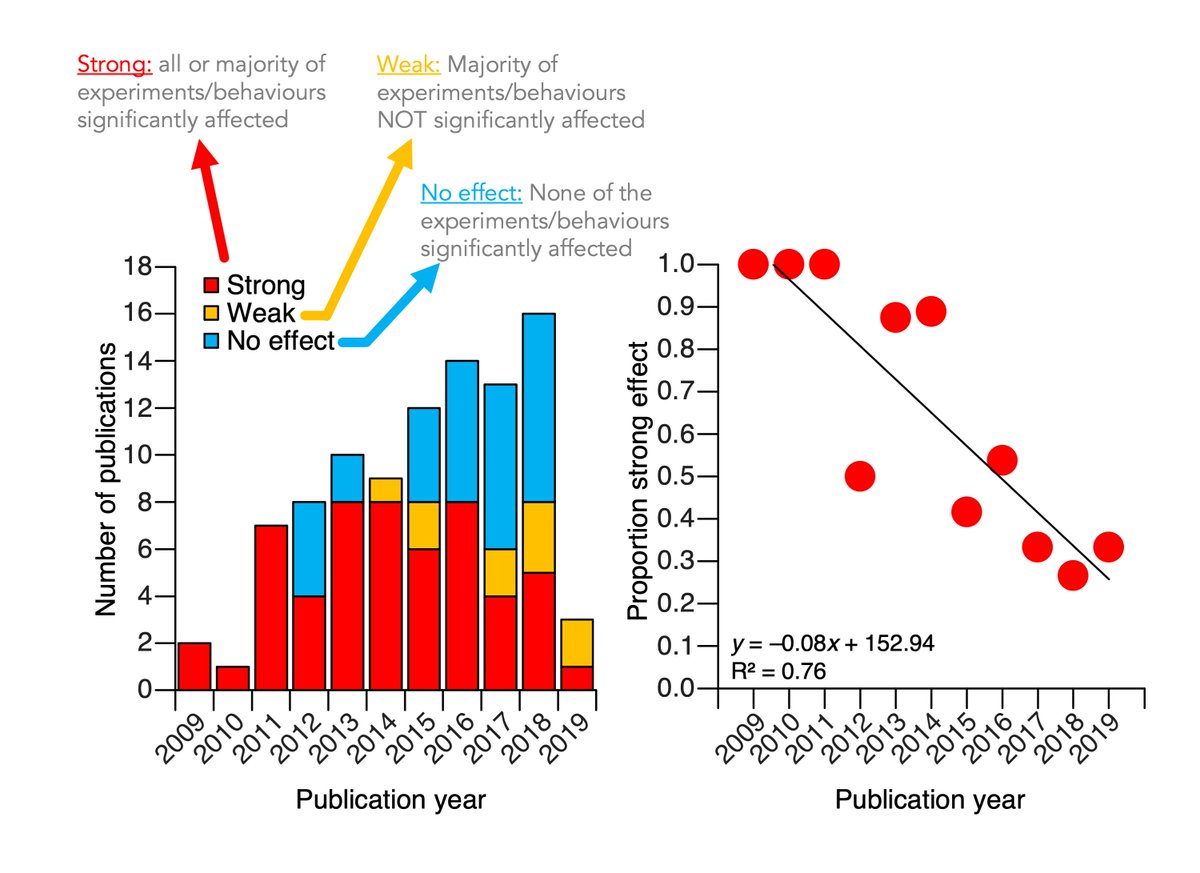
Our paper documenting an extreme decline effect in #oceanacidification studies on fish behaviour is now out in @PLOSBiology!
doi.org/10.1371/journa…
The paper is much different than the original preprint, so here’s a thread:
doi.org/10.1371/journa…
The paper is much different than the original preprint, so here’s a thread:

Some of the most drastic & ecologically worrisome impacts of #oceanacidification are reported for fish behaviour. Initial studies from 2009-2010 documented 100% impairment of anti-predator behaviour for fish exposed to ocean acidification conditions!
onlinelibrary.wiley.com/doi/10.1111/j.…
onlinelibrary.wiley.com/doi/10.1111/j.…

However, studies reporting no effects have seemingly increased in recent years, casting some doubt on these dire predictions
This phenomenon of decreasing effect sizes over time is not uncommon and is typically referred to as the “decline effect”
en.wikipedia.org/wiki/Decline_e…
This phenomenon of decreasing effect sizes over time is not uncommon and is typically referred to as the “decline effect”
en.wikipedia.org/wiki/Decline_e…

We wanted to determine whether a decline effect was evident among studies testing for #oceanacidification effects on fish behaviour
To do this, we used a systematic review & meta-analysis to compile a database of 795 observations across 91 studies
To do this, we used a systematic review & meta-analysis to compile a database of 795 observations across 91 studies

We found that these studies were strongly characterized by the decline effect
Effect sizes decreased dramatically over the past decade from >5 in 2009-2010 to <0.5 after 2015
Perhaps one of the strongest examples of this phenomenon in ecology to date!
Effect sizes decreased dramatically over the past decade from >5 in 2009-2010 to <0.5 after 2015
Perhaps one of the strongest examples of this phenomenon in ecology to date!

The decline effect could be biologically driven
Increasing studies over time on less sensitive cold-water species, non-olfactory behaviours & non-larval life stages could drive lower effect sizes in later years
But controlling for these did not remove the decline effect
Increasing studies over time on less sensitive cold-water species, non-olfactory behaviours & non-larval life stages could drive lower effect sizes in later years
But controlling for these did not remove the decline effect

However, decline effects are commonly driven by biases that the process of science is prone to
These include methodological biases such as underpowered studies early on in a field, publication bias, & citation bias
These include methodological biases such as underpowered studies early on in a field, publication bias, & citation bias
We found that studies reporting large effect sizes tended to cluster at low sample sizes
87% of studies reporting a mean effect size magnitude >1 used fewer than 30 fish per treatment; there was a sharp decrease in effect size magnitudes >0.5 when >30 fish were used
87% of studies reporting a mean effect size magnitude >1 used fewer than 30 fish per treatment; there was a sharp decrease in effect size magnitudes >0.5 when >30 fish were used

We also found that large effect size magnitudes tend to be published in high impact journals & continue to have a stronger influence on this field in terms of citations 

Finally, it is difficult to ignore the elephant in the room: the scientific integrity of some studies, particularly those authored by lead investigators of the initial 2009-2010 papers, has recently been questioned
doi.org/10.1126/scienc…
doi.org/10.1126/scienc…

At the request of the journal editors, we re-ran the analysis on a dataset excluding studies authored or co-authored by the lead investigators of the original 2009-2010 studies
The decline effect disappeared & effect size magnitudes were consistently low through time
The decline effect disappeared & effect size magnitudes were consistently low through time

We think #oceanacidification likely has negligible direct effects on fish behaviour
But current studies continue to disproportionately cite early studies, promoting broad impacts on fish behaviour & ecology
We hope our paper helps shift the mindset of this field
But current studies continue to disproportionately cite early studies, promoting broad impacts on fish behaviour & ecology
We hope our paper helps shift the mindset of this field
Finally, we want to be crystal clear here: our findings do NOT mean that #oceanacidification & #climatechange are non-issues
Warming & acidification will have other major impacts on marine organisms
But direct effects of acidification on fish behaviour likely aren’t among them
Warming & acidification will have other major impacts on marine organisms
But direct effects of acidification on fish behaviour likely aren’t among them
• • •
Missing some Tweet in this thread? You can try to
force a refresh









